Thomas James Richards, Diaries, Transcript Vol. 3, 26 January to 8 November 1916 - Part 22
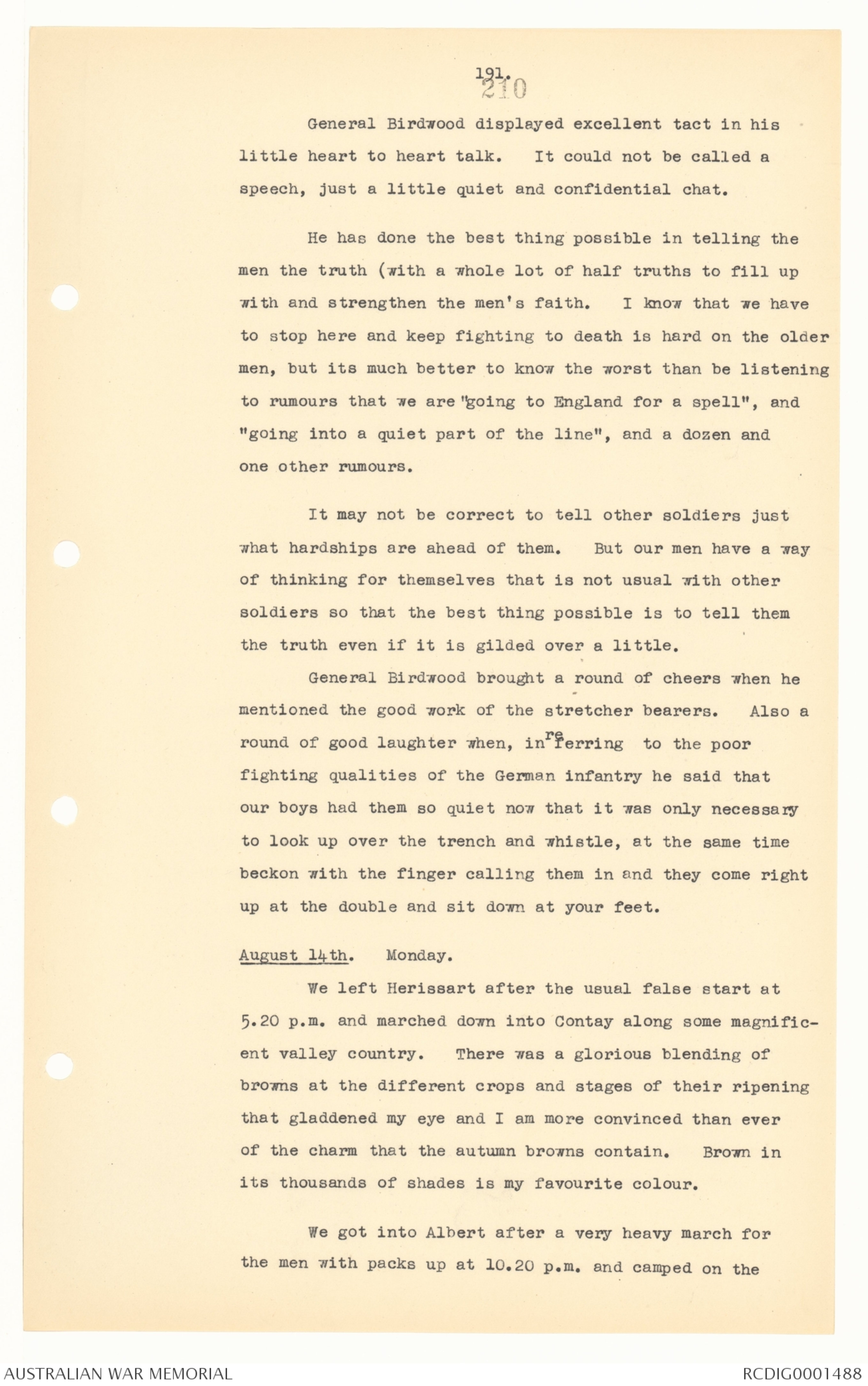
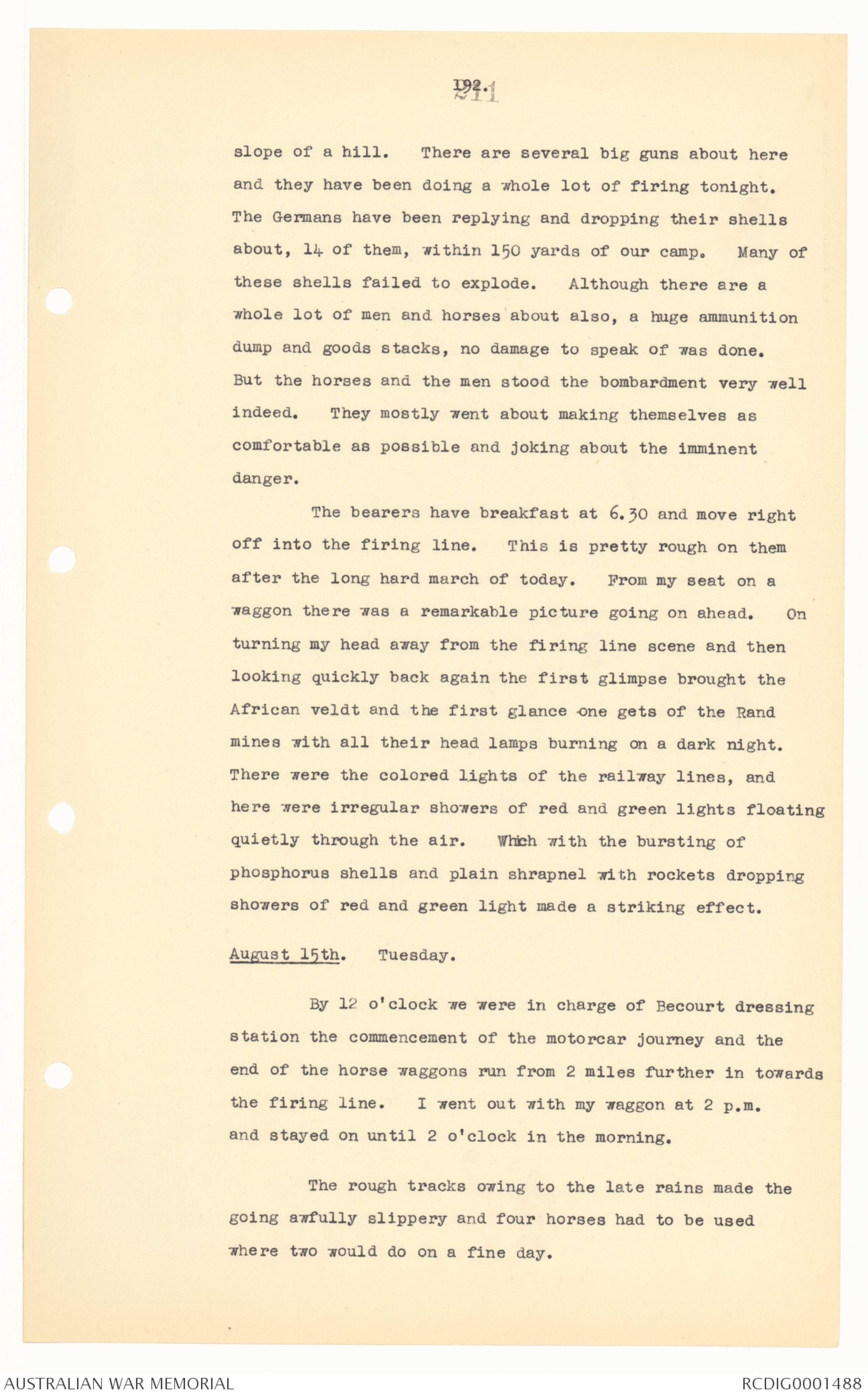
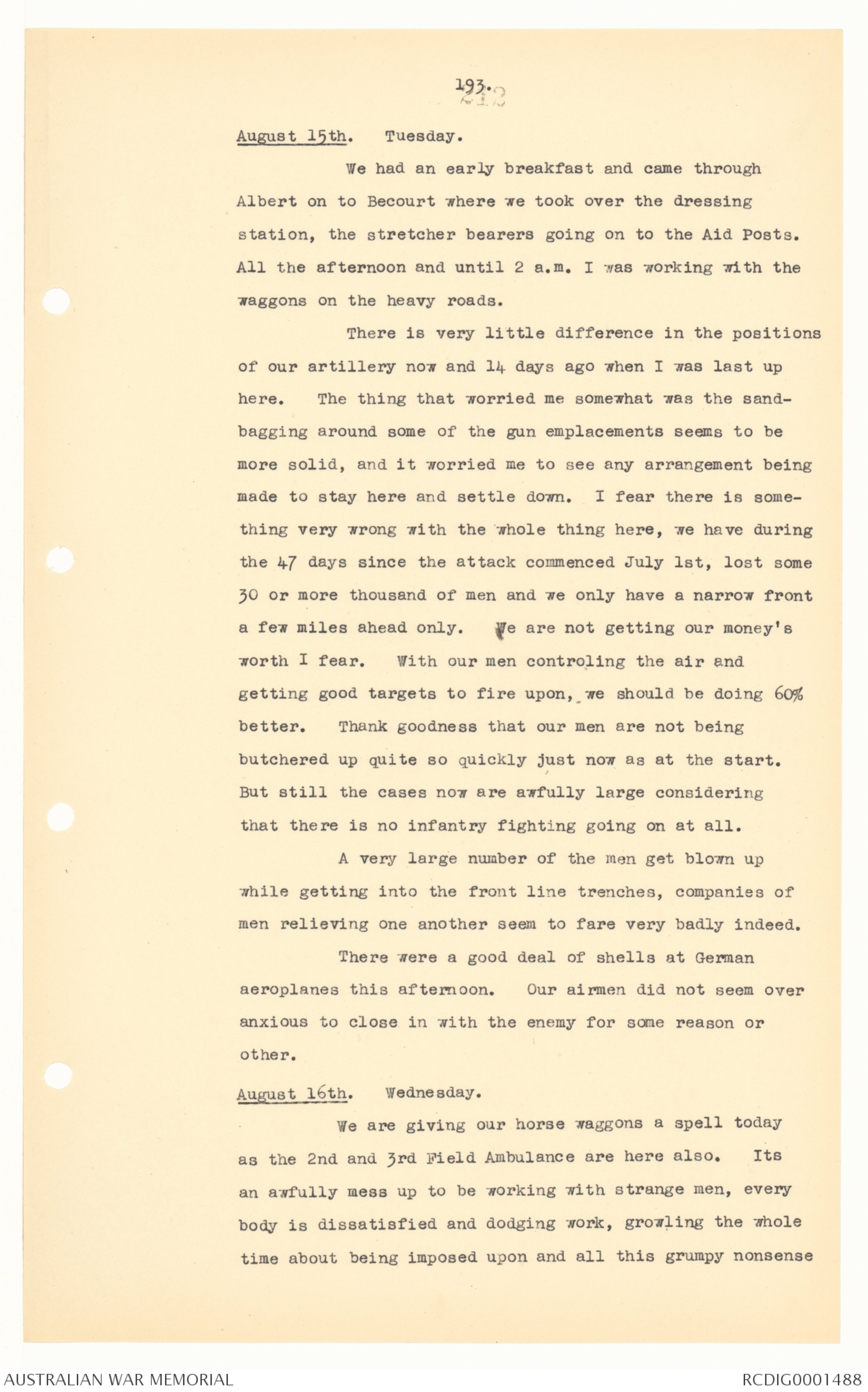
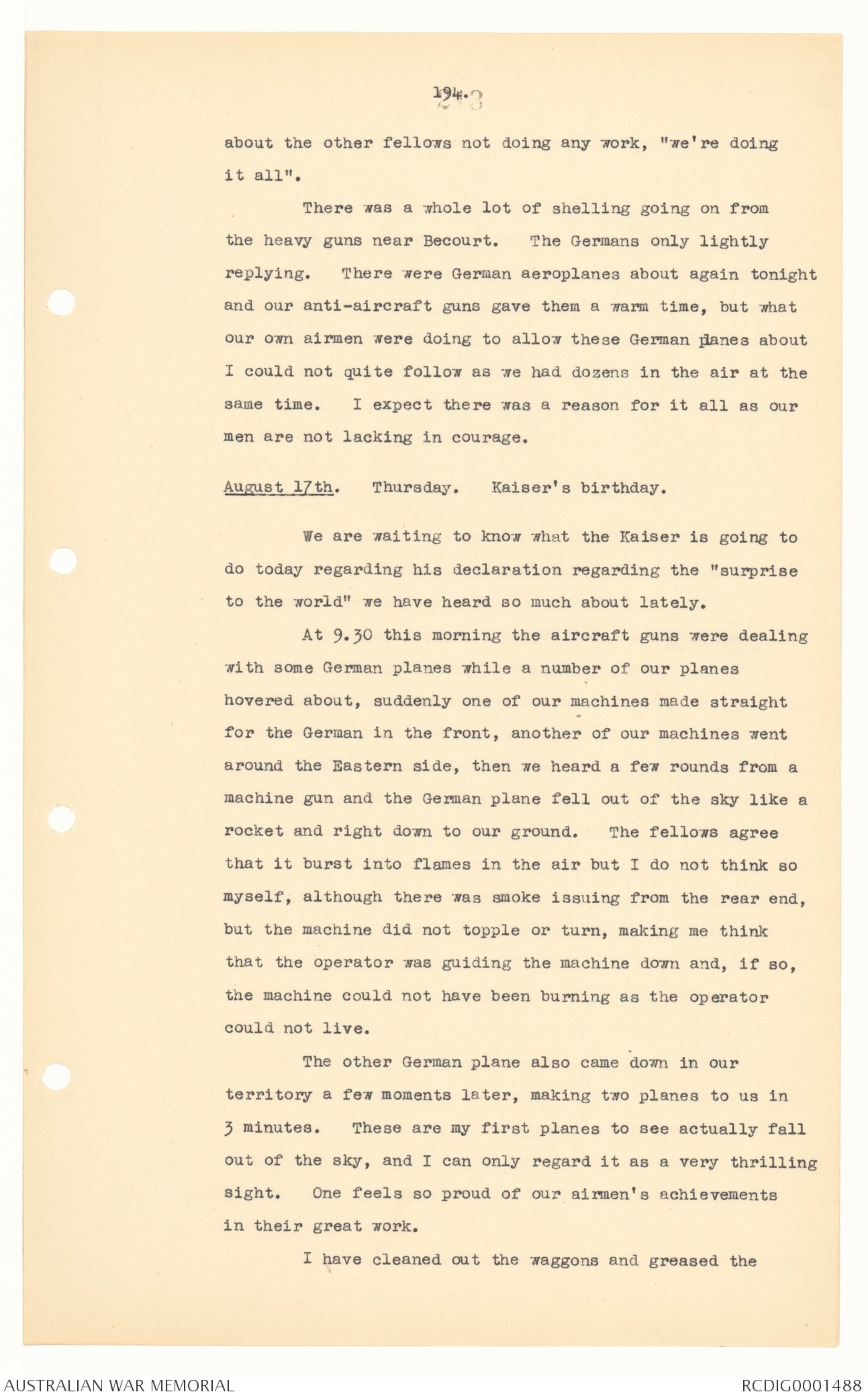
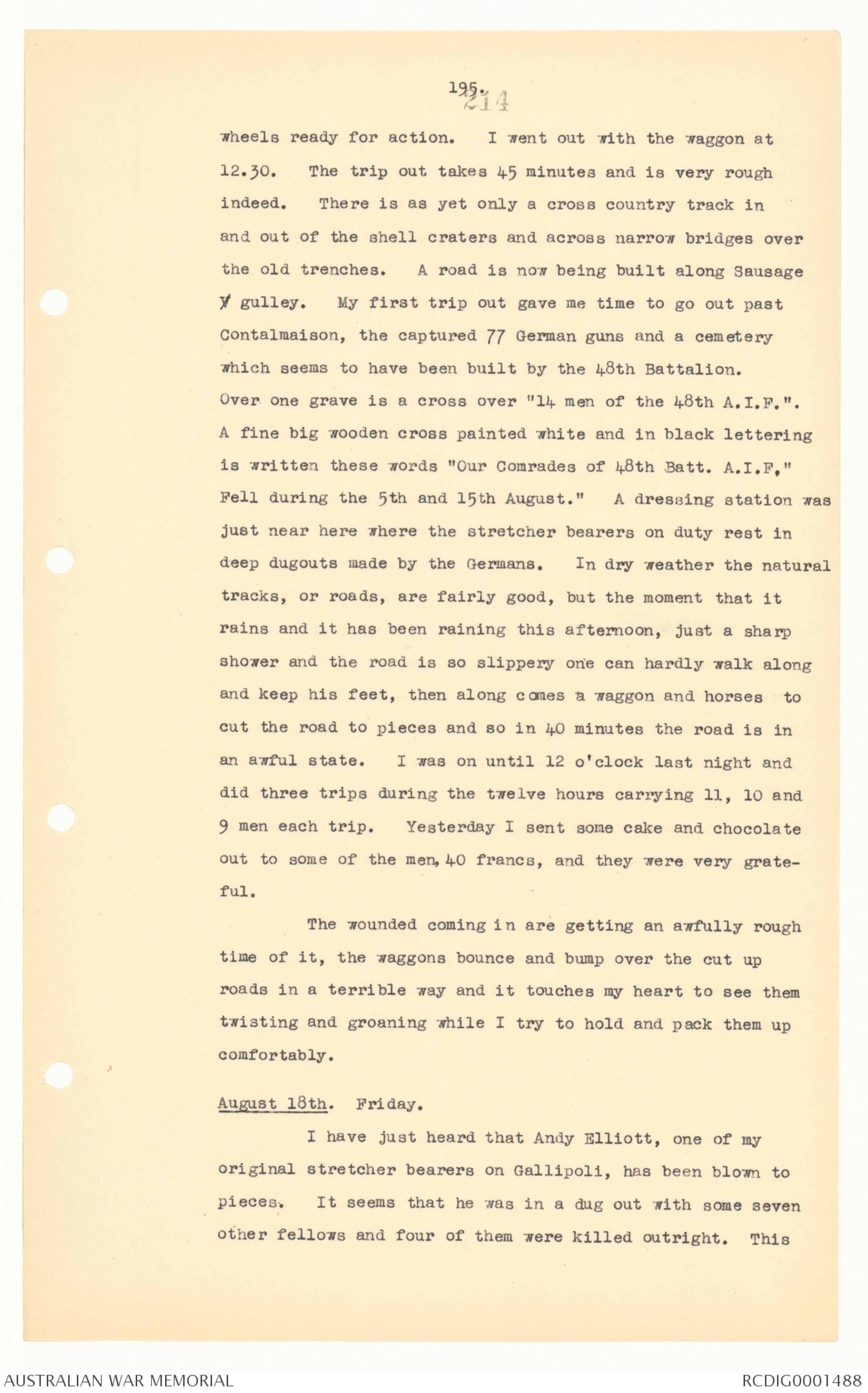
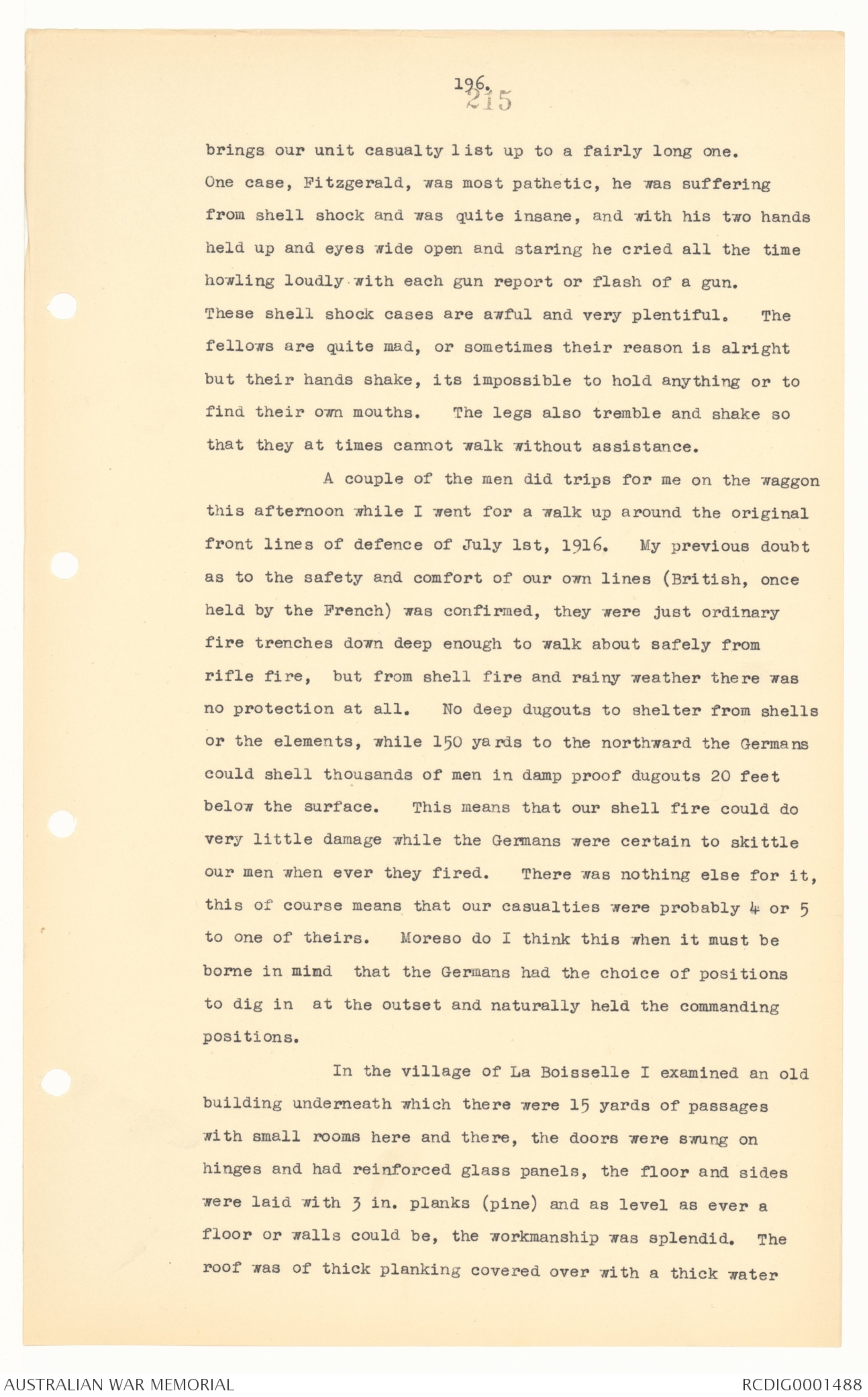
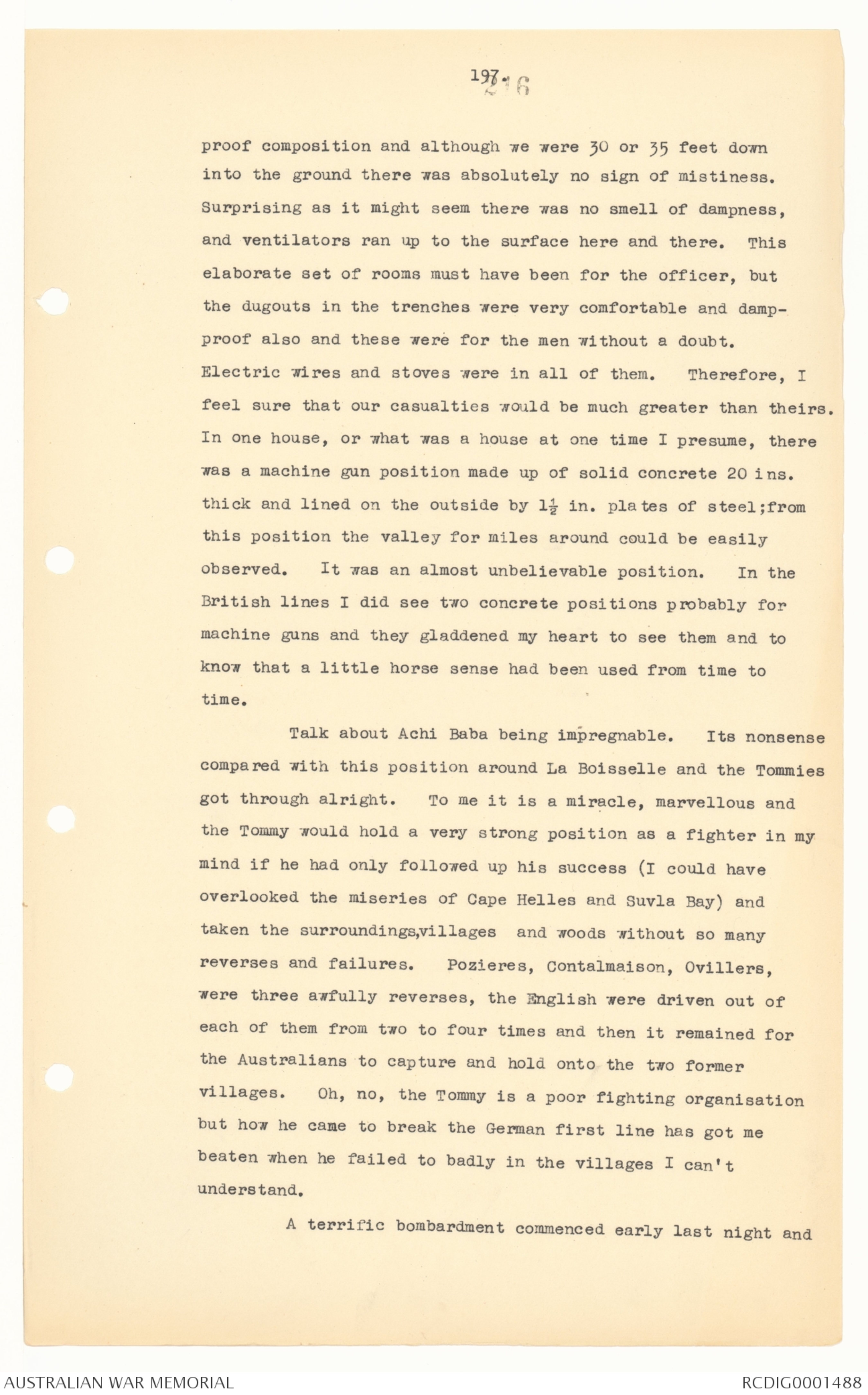
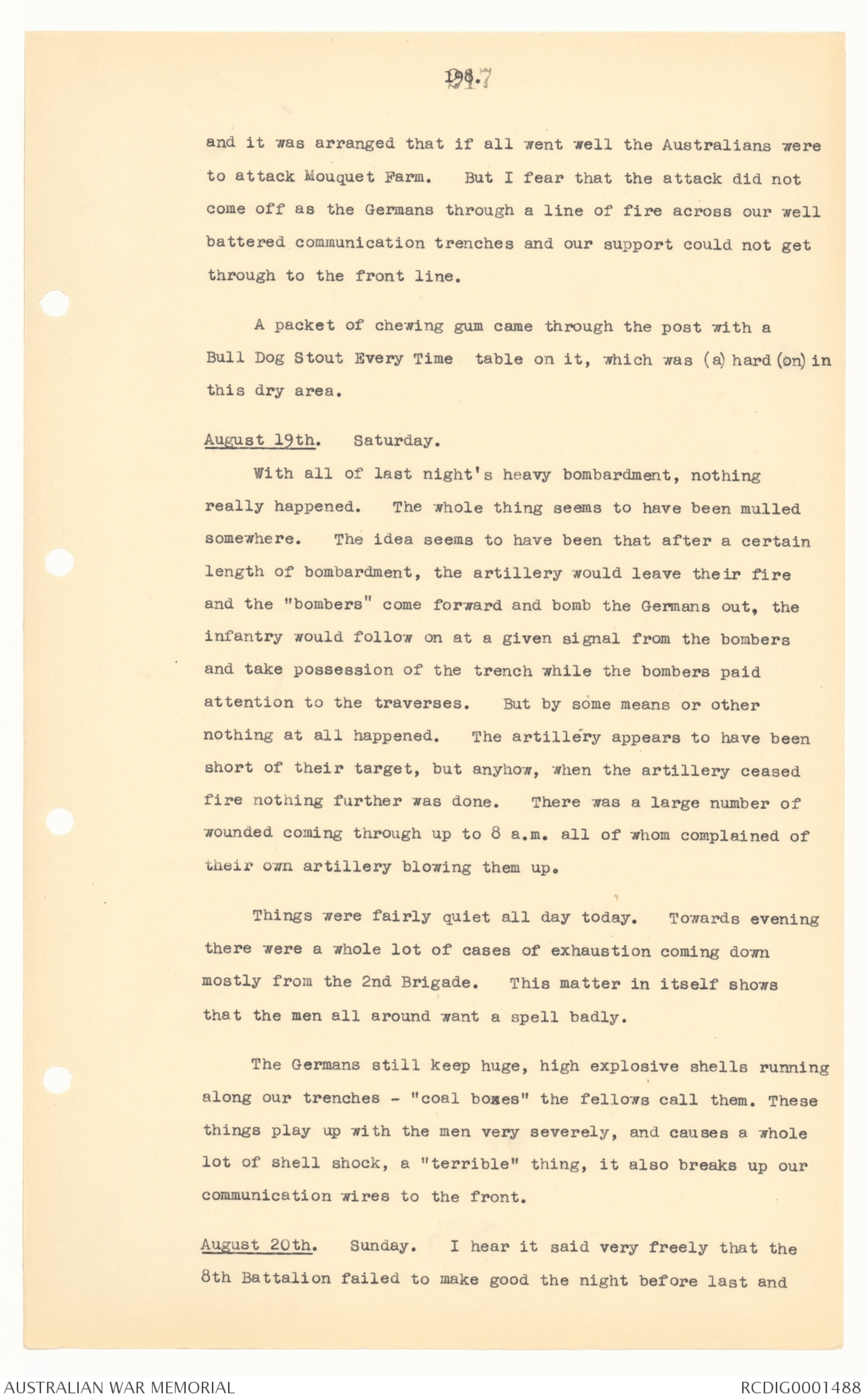
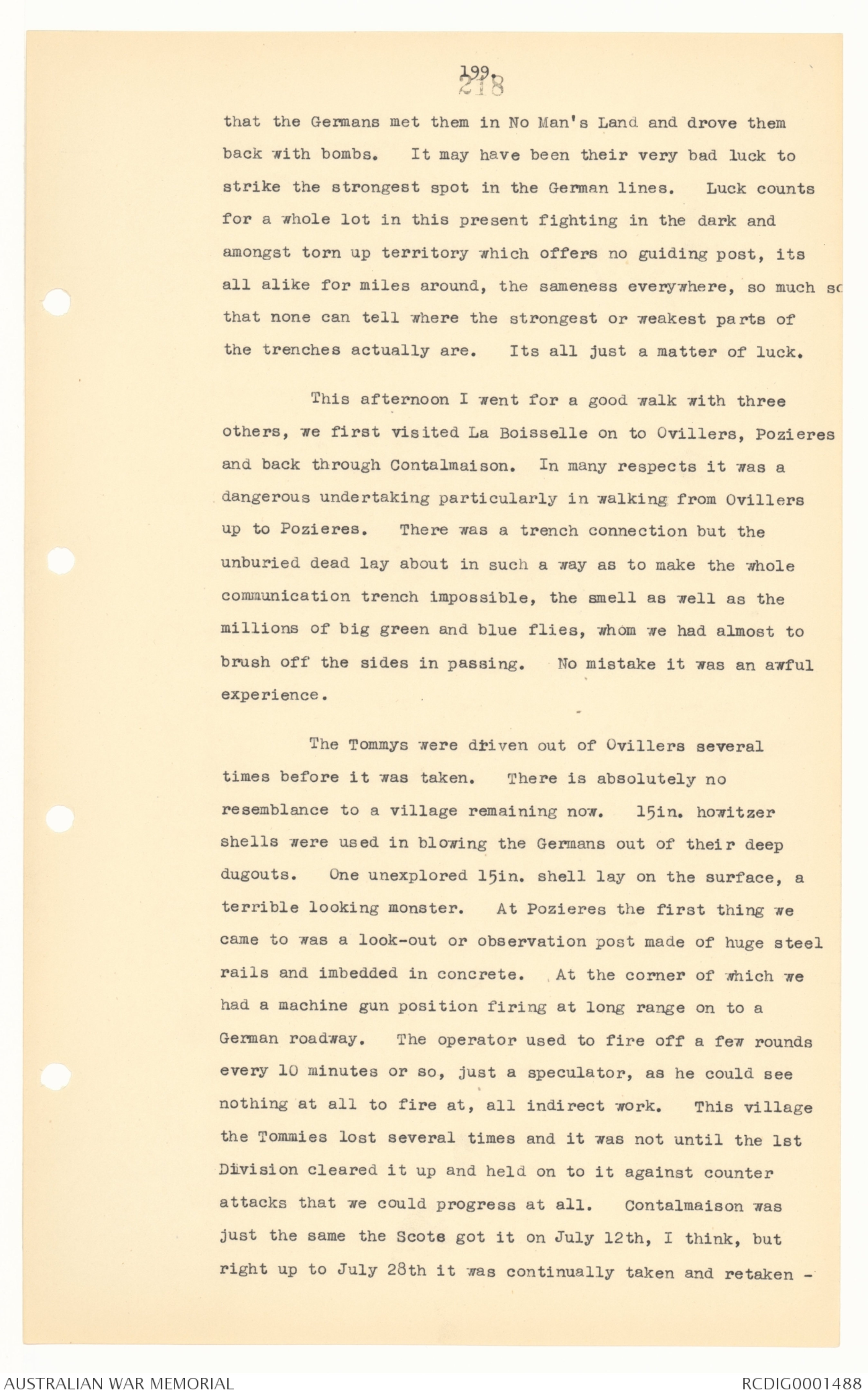
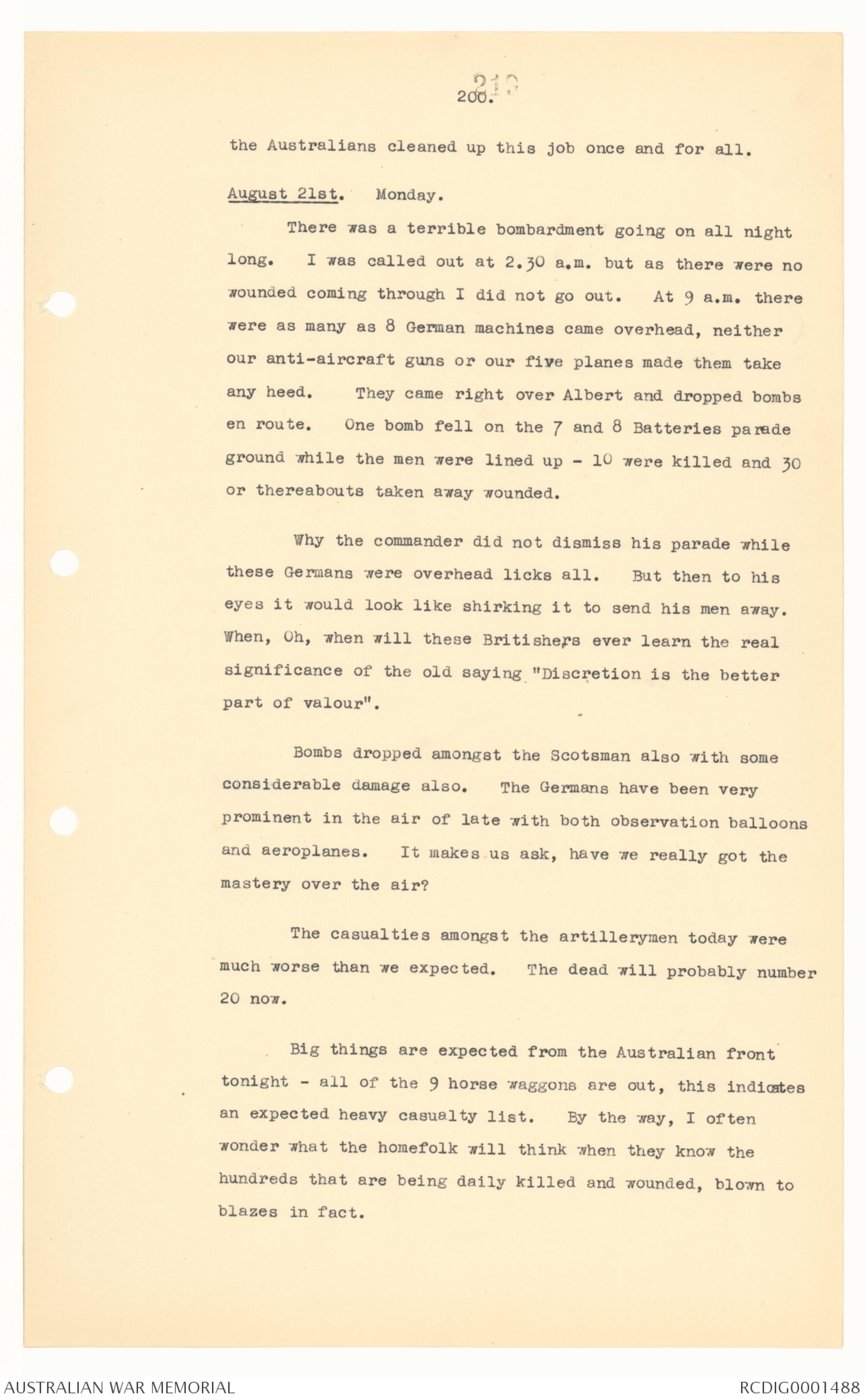
191.
210
General Birdwood displayed excellent tact in his
little heart to heart talk. It could not be called a
speech, just a little quiet and confidential chat.
He has done the best thing possible in telling the
men the truth (with a whole lot of half truths to fill up
with and strengthen the men's faith. I know that we have
to stop here and keep fighting to death is hard on the older
men, but its much better to know the worst than be listening
to rumours that we are "going to England for a spell", and
"going into a quiet part of the line", and a dozen and
one other rumours.
It may not be correct to tell other soldiers just
what hardships are ahead of them. But our men have a way
of thinking for themselves that is not usual with other
soldiers so that the best thing possible is to tell them
the truth even if it is gilded over a little.
General Birdwood brought a round of cheers when he
mentioned the good work of the stretcher bearers. Also a
round of good laughter when, in ^referring to the poor
fighting qualities of the German infantry he said that
our boys had them so quiet now that it was only necessary
to look up over the trench and whistle, at the same time
beckon with the finger calling them in and they come right
up at the double and sit down at your feet.
August 14th. Monday
We left Herissart after the usual false start at
5.20 p.m. and marched down into Contay along some magnificent
valley country. There was a glorious blending of
browns at the different crops and stages of their ripening
that gladdened my eye and I am more convinced than ever
of the charm that the autumn browns contain. Brown in
its thousands of shades is my favourite colour.
We got into Albert after a very heavy march for
the men with packs up at 10.20 p.m. and camped on the
192.
211
slope of a hill. There are several big guns about here
and they have been doing a whole lot of firing tonight.
The Germans have been replying and dropping their shells
about, 14 of them, within 150 yards of our camp. Many of
these shells failed to explode. Although there are a
whole lot of men and horses about also, a huge ammunition
dump and goods stacks, no damage to speak of was done.
But the horses and the men stood the bombardment very well
indeed. They mostly went about making themselves as
comfortable as possible and joking about the imminent
danger.
The bearers have breakfast at 6.30 and move right
off into the firing line. This is pretty rough on them
after the long hard march of today. From my seat on a
waggon there was a remarkable picture going on ahead. On
turning my head away from the firing line scene and then
looking quickly back again the first glimpse brought the
African veldt and the first glance one gets of the Rand
mines with all their head lamps burning on a dark night.
There were the coloured lights of the railway lines, and
here were irregular showers of red and green lights floating
quietly through the air. Which with the bursting of
phosphorus shells and plain shrapnel with rockets dropping
showers of red and green light made a striking effect.
August 15th. Tuesday.
By 12 o'clock we were in charge of Becourt dressing
station the commencement of the motorcar journey and the
end of the horse waggons run from 2 miles further in towards
the firing line. I went out with my waggon at 2 p.m.
and stayed on until 2 o'clock in the morning.
The rough tracks owing to the late rains made the
going awfully slippery and four horses had to be used
where two would do on a fine day.
193.
212
August 15th. Tuesday.
We had an early breakfast and came through
Albert on to Becourt where we took over the dressing
station, the stretcher bearers going on to the Aid Posts.
All the afternoon and until 2 a.m. I was working with the
waggons on the heavy roads.
There is very little difference in the positions
of our artillery now and 14 days ago when I was last up
here. The thing that worried me somewhat was the sand-bagging
around some of the gun emplacements seems to be
more solid, and it worried me to see any arrangement being
made to stay here and settle down. I fear there is something
very wrong with the whole thing here, we have during
the 47 days since the attack commenced July 1st, lost some
30 or more thousand of men and we only have a narrow front
a few miles ahead only. We are not getting our money's
worth I fear. With our men controlling the air and
getting good targets to fire upon, we should be doing 60%
better. Thank goodness that our men are not being
butchered up quite so quickly just now as at the start.
But still the cases now are awfully large considering
that there is no infantry fighting going on at all.
A very large number of the men got blown up
while getting into the front line trenches, companies of
men relieving one another seem to fare very badly indeed.
There was a good deal of shells at German
aeroplanes this afternoon. Our airmen did not seem over
anxious to close in with the enemy for some reason or other.
August 16th. Wednesday.
We are giving our horse waggons a spell today
as the 2nd and 3rd Field Ambulance are here also. Its
an awfully mess up to be working with strange men, every
body is dissatisfied and dodging work, growling the whole
time about being imposed upon and all this grumpy nonsense
194.
213
about the other fellows not doing any work, "we're doing
it all".
There was a whole lot of shelling going on from
the heavy guns near Becourt. The Germans only lightly
replying. There were German aeroplanes about again tonight
and our anti-aircraft guns gave them a warm time, but what
our own airmen were doing to allow these German planes about
I could not quite follow as we had dozens in the air at the
same time. I expect there was a reason for it all as our
men are not lacking in courage.
August 17th. Thursday. Kaiser's birthday.
We are waiting to know what the Kaiser is going to
do today regarding his declaration regarding the "surprise
to the world" we have heard so much about lately.
At 9.30 this morning the aircraft guns were dealing
with some German planes while a number of our planes
hovered about, suddenly one of our machines made straight
for the German in the front, another of our machines went
around the Eastern side, then we heard a few rounds from a
machine gun and the German plane fell out of the sky like a
rocket and right down to our ground. The fellows agree
that it burst into flames in the air but I do not think so
myself, although there was smoke issuing from the rear end,
but the machine did not topple or turn, making me think
that the operator was guiding the machine down and, if so,
the machine could not have been burning as the operator
could not live.
The other German plane also came down in our
territory a few moments later, making two planes to us in
3 minutes. These are my first planes to see actually fall
out of the sky, and I can only regard it as a very thrilling
sight. One feels so proud of our airmen's achievements
in their great work.
I have cleaned out the waggons and greased the
195.
214
wheels ready for action. I went out with the waggon at
12.30. The trip out takes 45 minutes and is very rough
indeed. There is as yet only a cross country track in
and out of the shell craters and across narrow bridges over
the old trenches. A road is now being built along Sausage
V gulley. My first trip out gave me time to go out past
Contalmaison, the captured 77 German guns and a cemetery
which seems to have been built by the 48th Battalion.
Over one grave is a cross over "14 men of the 48th A.I.F.".
A fine big wooden cross painted white and in black lettering
is written these words "Our comrades of 48th Batt. A.I.F."
Fell during the 5th and 15th August." A dressing station
was just near here where the stretcher bearers on duty rest in
deep dugouts made by the Germans. In dry weather the natural
tracks, or roads, are fairly good, but the moment that it
rains and it has been raining this afternoon, just a sharp
shower and the road is so slippery one can hardly walk along
and keep his feet, then along comes a waggon and horses to
cut the road to pieces and so in 40 minutes the road is in
an awful state. I was on until 12 o'clock last night and
did three trips during the twelve hours carrying 11, 10 and
9 men each trip. Yesterday I sent some cake and chocolate
out to some of the men, 40 francs, and they were very grateful.
The wounded coming in are getting an awfully rough
time of it, the waggons bounce and bump over the cut up
roads in a terrible way and it touches my heart to see them
twisting and groaning while I try to hold and pack them up
comfortably.
August 18th. Friday.
I have just heard that Andy Elliott, one of my
original stretcher bearers on Gallipoli, has been blown to
pieces. It seems that he was in a dug out with some seven
other fellows and four of them were killed outright. This
196.
215
brings our unit casualty list up to a fairly long one.
One case, Fitzgerald, was most pathetic, he was suffering
from shell shock and was quite insane, and with his two hands
held up and eyes wide open and staring he cried all the time
howling loudly with each gun report or flash of a gun.
These shell shock cases are awful and very plentiful. The
fellows are quite mad, or sometimes their reasons is alright
but their hands shake, its impossible to hold anything or to
find their own mouths. The legs also tremble and shake so
that they at time cannot walk without assistance.
A couple of the men did trips for me on the waggon
this afternoon while I went for a walk up around the original
front lines of defence of July 1st, 1916. My previous doubt
as to the safety and comfort of our own lines (British, once
held by the French) was confirmed, they were just ordinary
fire trenches down deep enough to walk about safely from
rifle fire, but from shell fire and rainy weather there was
no protection at all. No deep dugouts to shelter from shells
or the elements, while 150 yards to the northward the Germans
could shell thousands of men in damp proof dugouts 20 feet
below the surface. This means that our shell fire could do
very little damage while the Germans were certain to skittle
our men when ever they fired. There was nothing else for it,
this of course means our casualties were probably 4 or 5
to one of theirs. Moreso do I think this when it must be
borne in mind that the Germans had the choice of positions
to dig in at the outset and naturally held the commanding
positions.
In the village of La Boisselle I examined an old
building underneath which there were 15 yards of passages
with small rooms here and there, the doors were swung on
hinges and had reinforced glass panels the floor and sides
were laid with 3 in. planks (pine) and as level as ever a
floor or walls could be, the workmanship was splendid. The
roof was thick planking covered over with a thick water
197.
216
proof composition and although we were 30 or 35 feet down
into the ground there was absolutely no sign of mistiness.
Surprising as it might seem there was no smell of dampness,
and ventilators ran up to the surface here and there. This
elaborate set of rooms must have been for the officer, but
the dugouts in the trenches were very comfortable and damp-proof
also and there were for the men without a doubt.
Electric wires and stoves were in all of them. Therefore, I
feel sure that our casualties would be much greater than theirs.
In one house, or what was a house at one time I presume, there
was a machine gun position made up of solid concrete 20 ins.
thick and lined on the outside by 1½ in. plates of steel; from
this position the valley for miles around could be easily
observed. It was an almost unbelievable position. In the
British lines I did see two concrete positions probably for
machine guns and they gladdened my heart to see them and to
know that a little horse sense had been used from time to
time.
Talk about Achi Baba being impregnable. Its nonsense
compared with this position around La Boisselle and the Tommies
got through alright. To me it is a miracle, marvellous and
the Tommy would hold a very strong position as a fighter in my
mind if he had only followed up his success (I could have
overlooked the miseries of Cape Helles and Suvla Bay) and
taken the surroundings, villages and woods without so many
reverses and failures, Pozieres, Contalmaison, Ovillers,
were three awfully reverses, the English were driven out of
each of them from two to four times and then it remained for
the Australians to capture and hold onto the two former
villages. Oh, no, the Tommy is a poor fighting organisation
but how he came to break the German first line has got me
beaten when he failed so badly in the villages I can't
understand.
A terrific bombardment commenced early last night and
194.
217
and it was arranged that if all went well the Australians were
to attack Mouquet Farm. But I fear that the attack did not
come off as the Germans through a line of fire across our well
battered communication trenches and our support could not get
through to the front line.
A packet of chewing gum came through the post with a
Bull Dog Stout Every Time table on it, which was (a) hard (on) in
this dry area.
August 19th. Saturday.
With all of last night's heavy bombardment, nothing
really happened. The whole thing seems to have been mulled
somewhere. The idea seems to have been that after a certain
length of bombardment, the artillery would leave their fire
and the "bombers" come forward and bomb the Germans out, the
infantry would follow on at a given signal from the bombers
and take possession of the trench while the bombers paid
attention to the traverses. But by some means or other
nothing at all happened. The artillery appears to have been
short of their target, but anyhow, when the artillery ceased
fire nothing further was done. There was a large number of
wounded coming through up to 8 a.m. all of whom complained of
their own artillery blowing them up.
Things were fairly quiet all day today. Towards evening
there were a whole lot of cases of exhaustion coming down
mostly from the 2nd Brigade. This matter in itself shows
that the men all around want a spell badly.
The Germans still keep huge, high explosive shells running
along our trenches - "coal boxes" the fellows call them. These
things play up with the men very severely, and causes a whole
lot of shell shock, a "terrible" thing, it also breaks up our
communication wires to the front.
August 20th. Sunday. I hear it said very freely that the
8th Battalion failed to make good the night before last and
199.
218
that the Germans met them in No Man's Land and drove them
back with bombs. It may have been their very bad luck to
strike the strongest spot in the German lines. Luck counts
for a whole lot in this present fighting in the dark and
amongst torn up territory which offers no guiding post, its
all alike for miles around, the sameness everywhere, so much so
that none can tell where the strongest or weakest parts of
the trenches actually are. Its all just a matter of luck.
This afternoon I went for a good walk with three
others, we first visited La Boisselle on to Ovillers, Pozieres
and back through Contalmaison. In many respects it was a
dangerous undertaking particularly in walking from Ovillers
up to Pozieres. There was a trench connection but the
unburied dead lay about in such a way as to make the whole
communication trench impossible, the smell as well as the
millions of big green and blue flies, whom we had almost
to brush off the sides in passing. No mistake it was an awful
experience.
The Tommys were driven out of Ovillers several
times before it was taken. There is absolutely no
resemblance to a village remaining now. 15in. howitzer
shells were used in blowing the Germans out of their deep
dugouts. One explored 15in. shell on the surface, a
terrible looking monster. At Pozieres the first thing we
came to was a look-out or observation post make of huge steel
rails and imbedded in concrete. At the corner of which we
had a machine gun position firing at long range on to a
German roadway. The operator used to fire off a few rounds
every 10 minutes or so, just a speculator, as he could see
nothing at all to fire at, all indirect work. This village
the Tommies lost several times and it was not until the 1st
Division cleared it up and held on to it against counter
attacks that we could progress at all. Contalmaison was
just the same the Scots got it on July 12th, I think, but
right up to July 28th it was continually taken and retaken -
219
200.
the Australians cleaned up this job once and for all.
August 21st. Monday.
There was a terrible bombardment going on all night
long. I was called out at 2.30 a.m. but as there were no
wounded coming through I did not go out. At 9 a.m. there
were as many as 8 German machines came overhead, neither
our anti-aircraft guns or our five planes made them take
any heed. They came right over Albert and dropped bombs
en route. One bomb fell on the 7 and 8 Batteries parade
ground while the men were lined up - 10 were killed and 30
or thereabouts taken away wounded.
Why the commander did not dismiss his parade while
these Germans were overhead licks all. But then to his
eyes it would look like shirking it to send his men away.
When, Oh, when will these Britishers ever learn the real
significance of the old saying "Discretion is the better
part of valour".
Bombs dropped amongst the Scotsman also with some
considerable damage also. The Germans have been very
prominent in the air of late with both observation balloons
and aeroplanes. It makes us ask, have we really got the
mastery over the air?
The casualties amongst the artillerymen today were
much worse than we expected. The dead will probably number
20 now.
Big things are expected from the Australian front
tonight - all of the 9 horse waggons are out, this indicates
an expected heavy casualty list. By the way, I often
wonder what the homefolk will think when they know the
hundreds that are being daily killed and wounded, blown to
blazes in fact.
 Sam scott
Sam scottThis transcription item is now locked to you for editing. To release the lock either Save your changes or Cancel.
This lock will be automatically released after 60 minutes of inactivity.